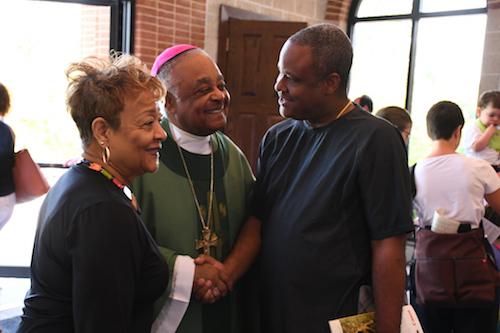|
Archbishop Gregory Continues Task of Restoring Trust
By D. Kevin Mcneir
Since his installation as the leader of the Archdiocese of Washington, May 21, Archbishop Wilton D. Gregory has provided needed leadership at a time when the Catholic Church has found itself inundated by troubling scandals and revelations. Throughout his many years of service, Archbishop Gregory has remained a man known for and respected because of his principles and dedication to seeking truth and doing the right thing. That said, his first few months have seen him visiting parishes throughout the Archdiocese — offering solace, guidance and laying out a plan of action. He spoke with The Washington Informer recently about his life, his new assignment and his plans to restore one of our most fragile human relationships: trust. Washington Informer: How do you speak to people in today’s current atmosphere of fear in the U.S. when many say their faith has been shaken? How do you inspire people and what do you say particularly to Black Catholics? Archbishop Gregory: I say the same thing to everyone, Catholic or not. I speak to their dignity as people recognizing the struggles they’ve endured and remind them of the importance of civil discourse. Yes, people are afraid in so many settings. Part of that fear is generated by a loss of the awareness of the dignity we each have as a child of God — no matter what religion or those who do not claim any religious affiliation, they still should be treated with dignity. Second, you encounter people as Pope Francis says, by speaking and listening. Right now, not a lot of listening has been going on in the human dialogue. A lot of protestations, hostile language — but very little listening, sincere listening. I really try to listen and in that listening come to understand others and their opinions. Hopefully, in that kind of dialogue I can engender a mutual respect. WI: There have recent challenges in the Catholic church in terms of leadership. Still, we hold those at the top to greater accountability. How do you restore that trust? Gregory: Trust is a fragile virtue and while it takes time to establish it can be ruptured quickly. I hope to offer to the Archdiocese a strengthening, a reestablishing of trust. But I’m aware that it will not happen overnight, especially because the breakdown occurred within the leadership. Still, as the Bible tells us, to whom much is given, much is required. It will take time to reestablish those trusting relationships — that’s clear to me. There’s no way I can be naïve about the uphill battle I face. WI: You have been visiting your parishes almost every day it seems. What’s your message as you make your rounds? Gregory: As a Catholic priest/bishop, I follow the liturgical year with the proposed scriptures that are to be read and listened to so they’re the foundation of my sermons. But our church is also one of doctrine and social teaching so I have to weave that into my preaching. I taught in the seminary after completing my doctoral studies, teaching liturgy, the rituals. I told my students and I believe that a good homily isn’t one that everyone agrees with — it’s one that you cannot forget. When you preach and speak to people, you have to build them up, give them hope, invite the best out of them. But sometimes you have to challenge them and help them to honestly say, ‘I can do more — be more. As a nation and within the Catholic community, we are now grappling with the dignity of human life. Catholics believe every human life has an innate value, not because we give it to them but because we’ve all been created by God. The dignity of life is something that belongs to us all: those waiting to be born, those who are prisoners, immigrants — documented or undocumented, the poor, those who live on the margins of society. Often the prophetic voice is most effective not in the words used but the actions in which it engages. I do agree, given social media and the capacity of modern communication, a lot of attention goes to those who bang the drum the loudest. But I have met people out here in the D.C. community who are doing the work of the gospel, generously, effectively. They’re the ones who establish the food banks, homes for the physically or mentally challenged and are standing with the immigrant community while providing legal services pro bono. In every instance, it’s not about securing political gain or attention — it’s because they know it’s the way Christ would have us to go. Contact: mcneirdk@washingtoninformer.com
|
.
Any original material on these pages is copyright © BishopAccountability.org 2004. Reproduce freely with attribution.
